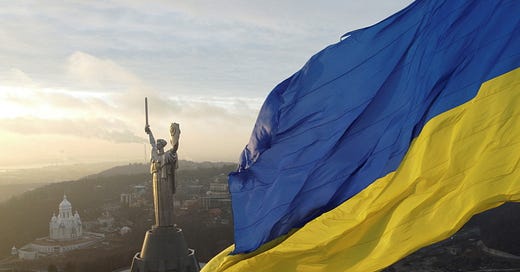What has been gradually dawning on me, especially in light of all the recent debates around the Ukraine aid bill and the stubborn resistence of Republicans to allow it to pass in the Congress, that the western Dissident Right is not only pro-Russian, but also is animated by a specific hatred of Ukraine, which can be traced to some very deeply subconscious reasons.
What Ukrainians have achieved with Maidan Revolution in 2013-2014 is in fact a unique phenomenon in the history of the modern West: a people, united by a fierce will and a grassroots movement, successfully rebelled against and toppled their corrupt government. Such a demonstration of collective power and determination stands in stark contrast to the struggles and failures of various other dissident movements, particularly in the West and Russia, where similar aspirations have floundered.
What’s noteworthy is that in the years leading up to the Maidan Revolution, there were also attempts at resistance in Russia, namely the protests in 2011-2012 against falsified elections to the State Duma. Back then figures like Navalny, who spearheaded these efforts, advocated for peaceful protest beseeching the government to step aside. However, this approach highlighted a deep-seated weakness within the movement. By imploring the government to relinquish power peacefully, the opposition revealed its underlying impotence, a tacit admission of their incapacity to forcefully oust the ruling regime.
The one who explicitly implores his abuser to step aside in order to avoid violence, in fact betrays his inability to enact that violence. Ukrainians, unlike the Russian liberal opposition did not ask the government to step aside out of goodwill. They acted and achieved that what the effete Russian liberal opposition failed to achieve two years earlier.
The same impotence is also characteristic of the Western dissident movements, particularly those that can be grouped under the Dissident Right, who similarly display a lack of the necessary resolve to effectuate significant change. Their animosity towards Ukraine, often manifested through a pro-Russian stance and dismissive attitudes towards the Maidan Revolution, therefore betrays a deeper sentiment of envy. These movements begrudge the Ukrainian people for achieving what they have long aspired to but have failed to realize due to their impotence - i.e., the overthrow of their own governments and transformation of their own societies.
The Maidan Revolution's success starkly contrasts with the ineffectuality of these Western and Russian dissident movements. The Ukrainians demonstrated that through courage, grit, and unwavering determination, it is possible to topple a government that does not serve the interests or the identity of its people, even when such a government is backed by a formidable military power. This feat is something neither the Western dissident populists nor the Russian liberal opposition have been able to achieve, mired as they are in debates over the legitimacy of armed resistance and plagued by an overwhelming sense of helplessness.
Particularly the western dissident rightists therefore often resort to pathetic conspiracy theories, labeling the Maidan Revolution as a "CIA coup" or the current Russian invasion as an American “hybrid war against Russia” etc., all in a desperate attempt to deny Ukraine its agency and to undermine the legitimacy of its struggle. Such assertions reflect not only their ignorance but, more importantly, their deep-seated unwillingness to accept the existence of a determined, passionate European nation capable of revolutionary change. This denial stems from their own failures and the uncomfortable recognition of their comparative weakness.
The crux of the issue lies in the concept of passionarity - i.e., the ability and desire to break the inertia and change the environment, a quality, as we can see, abundantly present in the Ukrainian spirit but sorely lacking in the dissident movements of the West and the mainstream liberal Russian opposition. Ukrainians have shown the world that it is possible to confront and defeat both domestic tyranny and foreign aggression through the sheer force of collective will. This reality serves as an uncomfortable mirror to those in the West and Russia who find themselves paralyzed by their own inaction and incapacity to mobilize for real change.
The bile spewn towards Ukraine from Western dissident circles therefore reveals more about their own shortcomings than it does about the Ukrainian struggle. It underscores their profound lack of passionarity, lack of determination and collective will, and a failure to grasp the essence of true revolutionary change.
For the follow-up on why the dissident Right is pro-Russian see this article.




I actually think this is quite similar to why a massive faction of the Left hates Ukraine and spouts these same narratives. The participants in movements like Occupy and BLM are embittered at their failure to change anything. And thus embittered at people elsewhere who did manage to change something.
The moment you stated “people united together toppled the government” is when any person who followed the coup of 2014 starts chuckling - it was a well funded, well organized coup - by those who later boasted about spending mere 5 billions for such a lush prize. Get real.